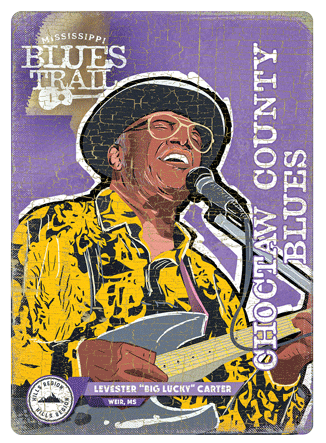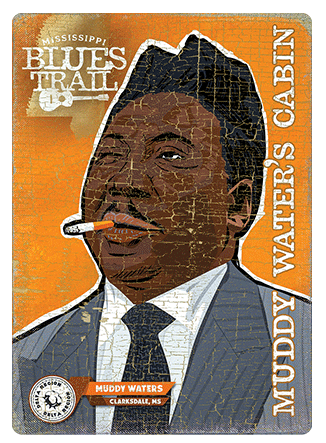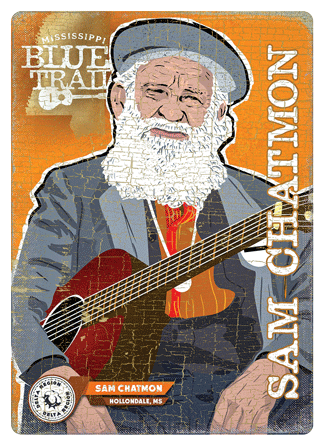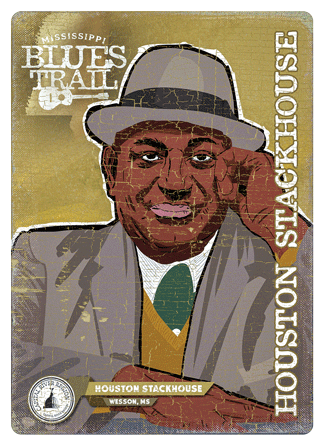
Choctaw County’s blues history is distinguished by the accomplishments of two artists in particular, both of them singers, songwriters, and guitarists: Levester “Big Lucky” Carter, who was born in Weir and raised on his family’s farm in French Camp, and Texas Johnny Brown from Ackerman. Carter, born on February 10, 1920, began recording in Memphis in the 1950s and climaxed his career with the award-winning CD “Lucky 13” in 1998. He died in Memphis on December 24, 2002.
Choctaw County ’s small African American community, although relatively isolated from the major centers of blues development in Mississippi, has produced musicians who achieved international renown in blues circles. In the Weir/French Camp area, the related Carter and Hemphill families laid much of the groundwork for the area’s blues legacy.
Levester “Big Lucky” Carter (1920-2002), a longtime singer, guitarist, and songwriter in Memphis, was born in Weir, where his father was a sharecropper. The family moved to his grandmother ’s in French Camp, where Carter attended the Mt. Salem M.B. Church and school. (Texas Johnny Brown, another acclaimed Choctaw County bluesman, attended a different Mt. Salem church and school near Ackerman). Carter ’s father, Charlie, sang blues and gospel, as did many other farm workers, Lucky recalled: “Late afternoon, you could hear the farmers in the fields. It was better than a radio station. You could hear people singing all around.” He also heard piano music at home from his aunt and his grandmother Susie Carter, and from his uncle ’s blues records. Guitarists Big Boy Anderson (who also played fiddle), James Henry, Arlee Miller, and men who made music beating on a box and playing a handsaw entertained at local dances. Carter ’s mother ’s father, Geet (or Gete, aka G. D.) Hemphill, also played fiddle, as did Dock Hemphill, the progenitor of a prolific musical family that moved to the Tate/Panola County area. Dock ’s son, multi-instrumentalist Sid Hemphill, recorded for the Library of Congress in 1942 in Sledge. Sid ’s daughters played guitar, and his granddaughter Jessie Mae Hemphill (1923-2006) was hailed as one of the world ’s premier female blues performers.
In Memphis Carter often performed in a band led by trumpeter Ed “Prince Gabe” Kirby (1929-1987), a cousin on the Hemphill side. The group recorded in 1957 for Sam Phillips of Sun Records, although the tracks were not released until the 1980s. In the ’ 60s Carter recorded four singles, including two for another famed Memphis producer, Willie Mitchell. His only CD, Lucky 13, on the British label Blueside, won awards from the magazines Living Blues in the U.S. and Soul Bag in France. French filmmaker Marc Oriol produced a documentary on Carter, Le Blues du Survivant.
Harmonica player Andrew Willie Brown, also known as Little Willie Brown, Harpkiller, and Lightning (1921-1981), claimed Weir as his birthplace when he registered for military service in 1942, but cited Ackerman at other times. He worked out of East St. Louis and recorded several singles in the 1950s and ’ 60s. The famed Staple Singers family also had Choctaw County roots. Roebuck “Pops” Staples ’ grandfather, William Staples (born c. 1835), and father, Warren (b. 1869), were from an area near Huntsville that was carved out to form part of Montgomery County in 1871. Rev. Archie Fair (c. 1909-1960), whose guitar playing inspired B. B. King, was born in French Camp.


